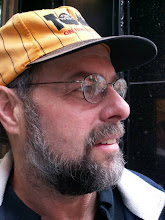
I heard the other night on ESPN that Hall of Fame pitcher Bob Feller had passed away at 92, following a battle with leukemia. My mind flew back to meeting Rapid Robert in 1964, well past his playing days. He was on a speaking tour of some sort, and visited the local Masonic Lodge in Sherman, NY. My dad took my older brother, Jim, and me to hear his talk. Jim and I were rapidly developing an addiction to baseball, and the thought of meeting a Hall of Fame pitcher was just about the most exciting thing we could imagine. Jim and I were both in our early teens.
The death of Ron Santo, a couple months earlier, in many ways hit me harder than Bob Feller's passing. Santo, the third baseman for the Chicago Cubs in the 60s and early 70s, was known as a good guy and great power hitter for the hapless Cubs. Later he become a radio/TV announcer, as well as the Cub's #1 fan. I watched him play many times on TV, but never met him or even watched him play live. As good a player as he was, he never made it into the Hall of Fame. Still he was known as probably one of the 10 best third baseman of all-time. Adding to his accomplishments was the fact (unknown to the public then) that Santo battled Type-I diabetes throughout his career. Since I watched him during my formative baseball years, Ron Santo held a special significance to me.
Feller's passing also hit me hard, too, but in a different way. He was one of the true giants of the game, and I had actually met him. As great as he was, he could sometimes be combative and self-aggrandizing. When my favorite baseball hero, Sandy Koufax, beat his single-season strike-out record in 1965, Feller was ungracious or at minimum ungentlemanly in recognizing the new record. Feller correctly pointed out that the average number of strikeouts in a 9-inning game was signicantly higher in 1965 than when he set the record in 1946. He forgot to mention , though, that the talent pool in 1946 had been considerably diminished by the loss of top players, due to WWII attrition. On balance, especially given that Koufax played a longer season, I think Feller's argument was valid, but he still seemed more than a little ungracious to me.
Feller also had a distinguished military career, flighting in World War II in the Navy. He enlisted three days after Pearl Harbor attack, the first major league player to do so. He served almost 4 years in the Navy, as Gun Captain on the USS Alabama, in both the European and Pacific Theaters. He received 12 military medals, and is the only Chief Petty Officer in the MLB Hall of Fame.
Feller held a number of pitching records when he retired in 1956. He had 3 no-hitters and 12 one-hitters, a record he still shares. He had 266 wins and led the league in strikeouts 7 times. (On the downside, he held the record for most walks in a career, most hit batsman, and still holds the record for most walks in a season.) Some baseball historians say that he probably would have had 350 wins and 3000 strikeouts, if he had not lost four years to the military. He always said he never missed not getting those 90-100 wins, because he contributed to the biggest win of all for our country.
http//www.nytimes.com/2010/12/16/sports/baseball/16feller.html
RIP, Bob Feller


